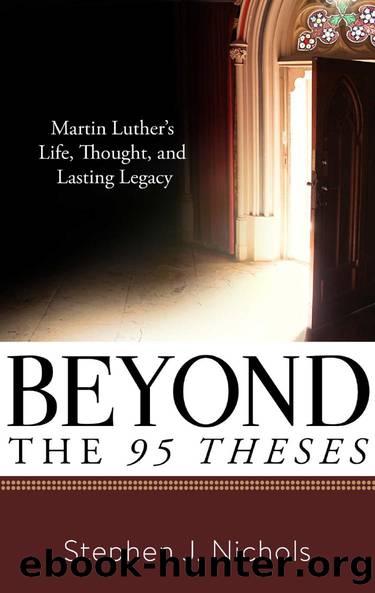Beyond the Ninety-Five Theses by Stephen J. Nichols

Author:Stephen J. Nichols [Nichols, Stephen J.]
Language: eng
Format: epub
ISBN: 9781629953311
Goodreads: 32761658
Publisher: P & R Publishing
Published: 2016-11-30T00:00:00+00:00
The Two Kingdoms and the Three Estates
Luther would admit freely that the papacy and the church had overstepped its bounds. As we saw in his Address to the German Nobility, Luther challenged the Roman churchâs assertion of power over the German princes. While Luther held to a certain separation of church and state, he also distanced himself from the radical wing of the Reformation. Historians designate the various Anabaptist groups as comprising the radical Reformation not because of our understanding of the term radical, but because the Latin word, radix, from which we get the English word radical means âroot.â The radical reformers wanted to go further than Luther, Zwingli, and Calvin and get at the root of the problem: the merger of church and state. Consequently, the radical reformers advocated a total separation of church and state, a mark of Anabaptist traditions that continues to this day. It was an idea, however, that Luther could not see as right. He forged his own way, and, in the process, developed a significant understanding of how to relate these two spheres of the church and state.
Fig. 7.1 Major Ethical Writings
1519 âA Sermon on the Estate of Marriageâ
1520 To the Christian Nobility of the German Nation (Three Treatises)
1522 The Estate of Marriage
1523 On Temporal Authority: To What Extent Should It Be Obeyed
April 1525 Admonition to Peace Based on the Twelve Articles of the Peasants in Swabia
May 1525 Against the Robbing and Murdering Bands of Peasants
July 1525 An Open Letter on the Harsh Book Against the Peasants
1527 Whether One May Flee from a Deadly Plague
1531 Dr. Martin Lutherâs Warning to His Dear German People
Borrowing from Augustine, Luther viewed the two cities as two kingdoms in conflict. And, he held that the Kingdom of God will prevail. Unlike Augustine and the radical reformers, Luther saw value in the earthly kingdom. The Christian, he argued, is a citizen of both kingdoms, liable to their laws and customs and participant in the activities of each. Further, Godâs law concerns both kingdoms. Luther demonstrates this by appealing to the essence of the law, as summarized by Christ. The first great commandment, to love God with oneâs whole heart, soul, mind, and strength, concerns the kingdom of God. The second, to love oneâs neighbor, governs the Christianâs life in the earthly kingdom (Luke 10:27). The Christian should also not preclude the earthly kingdom because it was created by God. In fact, Luther refers to Augustineâs city of humanity as the kingdom of creation. He also prefers the term âkingdom of redemptionâ to the designation of the city of God.
These two kingdoms, the kingdom of creation and the kingdom of redemption, function separately, and, to be sure, the kingdom of redemption takes priority ultimately and in the individualâs life. The Christian, however, is to live as a citizen of both, and Luther argues that God does not leave us without some instructions as to how to be good citizens of both. The summation of the law as both to love God and to love our neighbor is a good place to start.
Download
This site does not store any files on its server. We only index and link to content provided by other sites. Please contact the content providers to delete copyright contents if any and email us, we'll remove relevant links or contents immediately.
Harry Potter and the Goblet Of Fire by J.K. Rowling(3046)
Unfinished: A Memoir by Priyanka Chopra Jonas(2918)
Never by Ken Follett(2881)
The Man Who Died Twice by Richard Osman(2300)
Machine Learning at Scale with H2O by Gregory Keys | David Whiting(2291)
Fairy Tale by Stephen King(2070)
Will by Will Smith(2042)
Rationality by Steven Pinker(1765)
The Storyteller by Dave Grohl(1660)
The Dawn of Everything: A New History of Humanity by David Graeber & David Wengrow(1571)
The Dark Hours by Michael Connelly(1570)
The Stranger in the Lifeboat by Mitch Albom(1532)
Cloud Cuckoo Land by Anthony Doerr(1435)
The Becoming by Nora Roberts(1331)
Friends, Lovers, and the Big Terrible Thing by Matthew Perry(1328)
New Morning Mercies: A Daily Gospel Devotional by Paul David Tripp(1325)
Crying in H Mart by Michelle Zauner(1316)
Einstein: His Life and Universe by Walter Isaacson(1315)
A Short History of War by Jeremy Black(1300)
